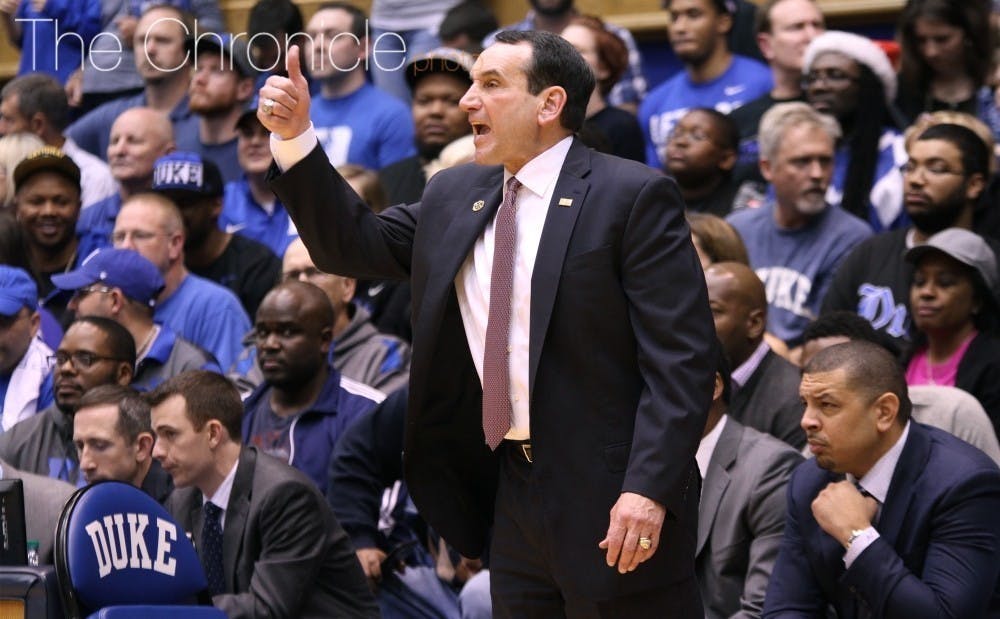One of the most-followed, most-watched and most-hated programs in college basketball’s history owes much of its success to the leadership of head coach Mike Krzyzewski, who’s led five Duke teams to national championships in three different decades. If we were to group his men’s basketball alumni into teams by jersey numbers, though, whose contribution would be the most significant?
To think about the Blue Devils’ lasting legacy, we can think about four important criteria and rank them on a 10-point scale:
- Regular Season Production: Krzyzewski’s teams have historically done extremely well in the regular season, racking up wins against highly-ranked teams and producing some of the best statistical seasons in NCAA history.
- Postseason Success: Cameron Crazies value winning. Whether in the ACC or NCAA tournament, the most memorable greats have played championship basketball.
- Leadership: Every well-run ship has its captain. "The Brotherhood” is exemplified by individual sacrifice toward a common goal.
- Popularity: Duke regularly enjoys the top talents out of high school and some of the highest television ratings in college sports. Much of this is due to Krzyzewski’s reputation, but undoubtedly the fame of individual players influences the school’s recruiting prowess.
We can rate jersey numbers using these categories to determine the sustained impact of each number on Duke men’s basketball.
5) Number 34
Notable Players: Mike Dunleavy Jr., Wendell Carter Jr., Ryan Kelly
Mike Dunleavy Jr. played three years for the Blue Devils, scoring 13.2 points per game along with an impressive 1.6 steals per game. His most notable contributions came during the 2000-01 season in which the forward started for a national championship team. He finished the season averaging the third-most points and was named a co-captain the following year. Dunleavy was not the top player on the team, but he left his mark as a consistent scorer.
Most Crazies remember Wendell Carter Jr.’s controversial blocking foul in overtime vs. Kansas in the Elite Eight. The 2017-18 team would fail to make the Final Four as a result with much blame riding on the supposed missed call late in the game. Carter became the seventh pick in the NBA draft after averaging 13.5 points and 9.1 rebounds per game during his freshman season.
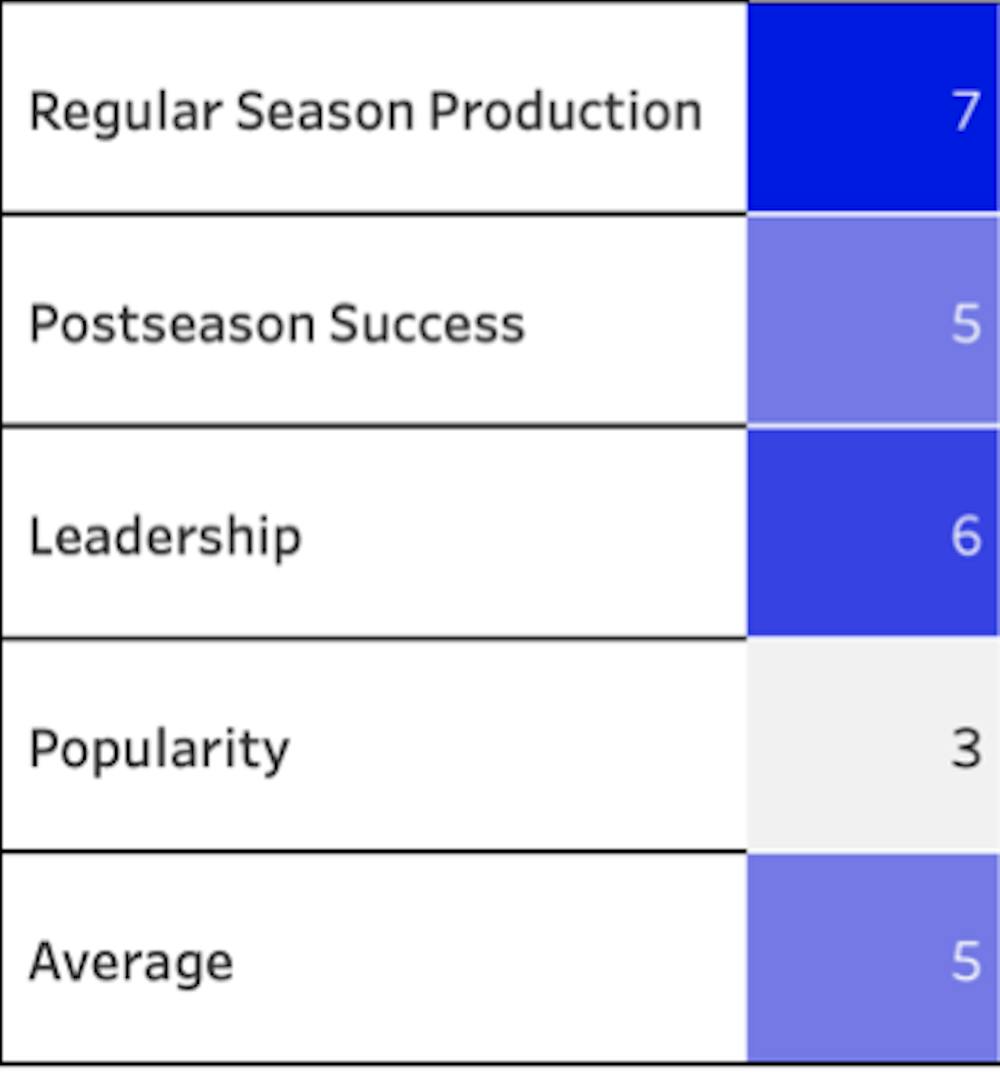
The legacy of 34 is one of winning. Dunleavy and Kelly both won national championships at Duke, and there’s reason to speculate that Carter could have done the same. 34s are solid, winning players, but none of the 34s were a true top player on their respective team. Though these players were often overshadowed by their peers, there’s no doubt that their input was essential to successful seasons.
4) Number 15
Notable Players: Jahlil Okafor, Gerald Henderson, Frank Jackson
Most consider Jahlil Okafor the best player on Duke’s most recent national championship team. Okafor could do it all in the post and he led the team in points and rebounds per game. As ACC Player of the Year and unanimous first team All-American, Okafor was destined for greatness as he and package deal recruiting partner Tyus Jones delivered Krzyzewski his fifth title.
Gerald Henderson played three seasons at Duke, ultimately co-leading the team in scoring during his final season before entering the draft. That 2008-09 squad would win the ACC championship, but Henderson wasn’t quite able to secure a national title prior to his departure.
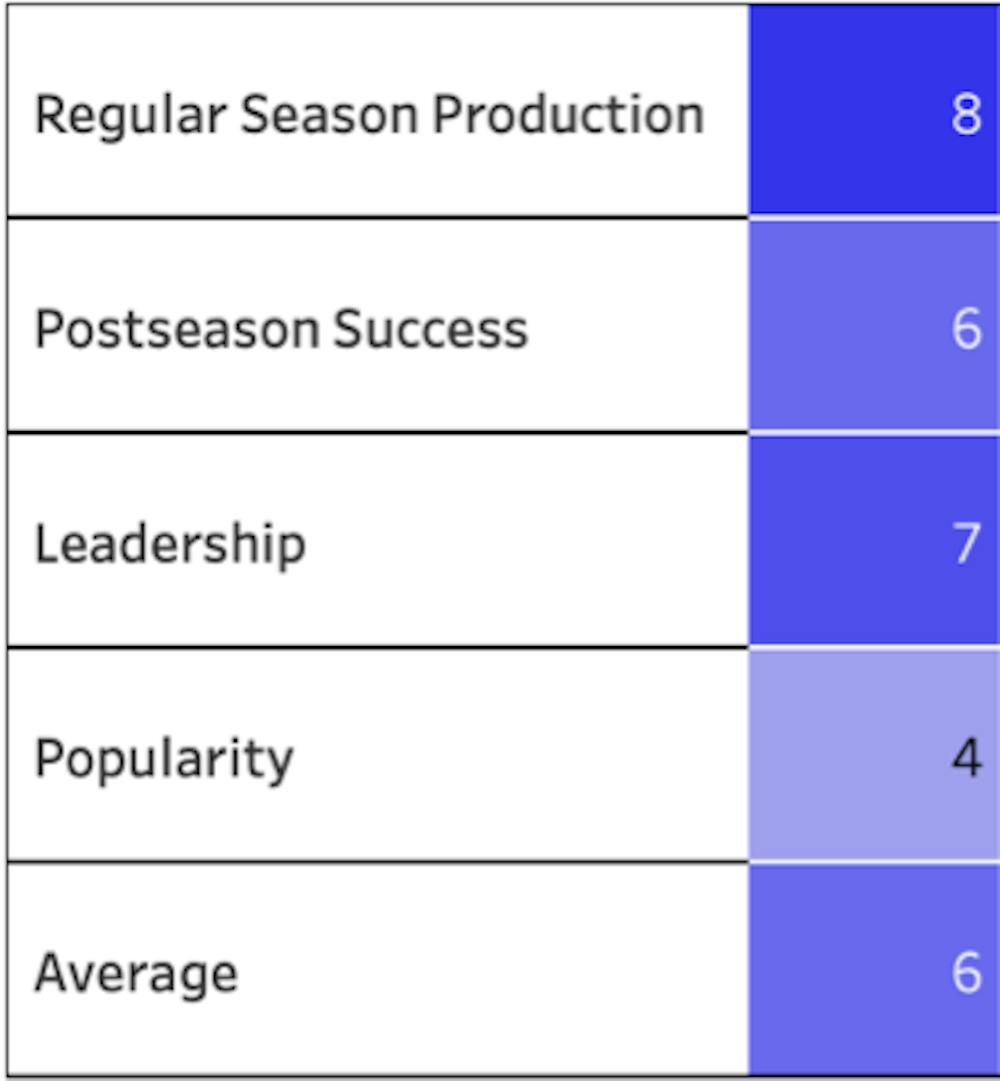
The number 15 has given Duke a national championship and productive multi-year players. 15s have proven to contribute to widespread team success. However, players like Okafor, Henderson and Jackson don’t have the “wow” factor that other Duke players have. They were consistent, but individually didn’t necessarily disrupt the college basketball scene as a whole.
3) Number 2
Notable Players: Nolan Smith, Quinn Cook, Luol Deng, Gary Trent Jr., Cassius Stanley, Cam Reddish, Josh McRoberts
Krzyzewski now has Nolan Smith on staff as the director of basketball operations, continuing his long-standing legacy in Durham. Smith most notably formed the deadly 2010 backcourt combination along with now-assistant coach Jon Scheyer. Smith averaged 17.4 points per game as a junior that year, and would eventually lead the team in scoring the following season with 20.6 points per game. He finished his college career as ACC Player of the Year and a consensus All-American selection.
As a senior, Quinn Cook played a pivotal role in guiding the most successful one-and-done team under Krzyzewski. He was a team captain in more ways than just a title, famously deferring the point guard role to freshman Tyus Jones and moving to the two-spot. Even with a positional change, Cook was able to put up 15.3 points per game and the Blue Devils were able to secure a fifth national championship. He steadily improved as a player during his four years but above all, Cook demonstrated a willingness to sacrifice individual acclaim for the good of the team when he enabled younger players to flourish.
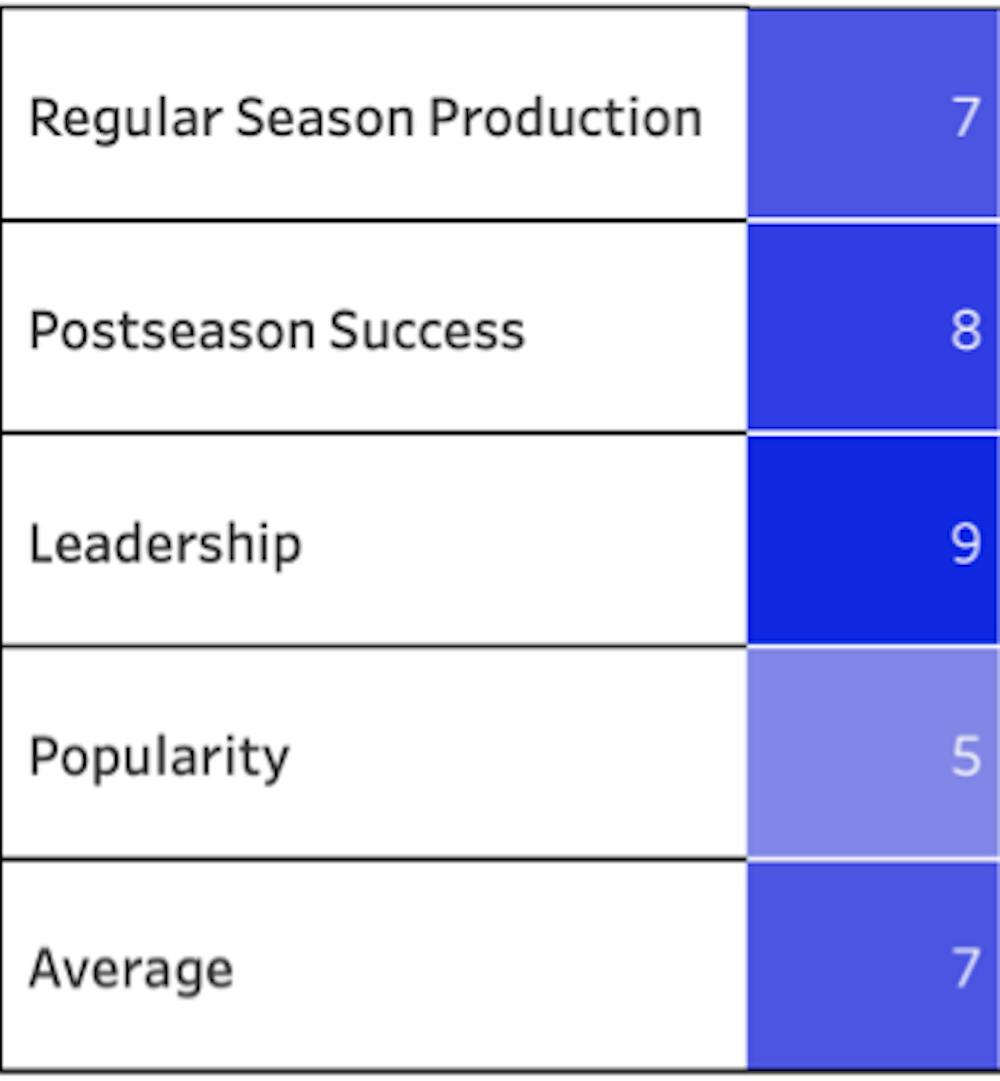
2s at Duke haven’t just won championships—they played extensive minutes for their winning teams as some of the most dominant scorers on the court. Those who didn’t win championships still were featured starters and leaders on iconic Duke teams. One-and-dones like Cam Reddish and Cassius Stanley were top three players on their teams as well and delivered supporting points on the wing.
2) Number 1
Notable Players: Zion Williamson, Jabari Parker, Vernon Carey Jr., Kyrie Irving, Harry Giles
Naismith Player of the Year, No. 1 draft pick and NBA superstar Zion Williamson set the college basketball world ablaze during the 2018-19 campaign. Williamson consistently set the tone for the season with his electrifying dunks and enthusiasm for team play in Krzyzewski’s system. His play drew the attention of all sports fans in unparalleled fashion, even attracting former President Barack Obama courtside for the home game against North Carolina. The squad narrowly lost to Cassius Winston and Michigan State in the Elite Eight, but Williamson’s legacy at Duke remains the most memorable of any non-championship player to set foot in Durham.
Jabari Parker’s NBA career has been derailed by multiple knee injuries and his college accomplishments seem to be a bit undervalued nowadays. In 2013-14, Parker was a walking double-double threat every time he picked up a basketball, averaging 19.1 points and 8.7 rebounds per game. One can’t help but discount him for the embarrassing loss to Mercer in the NCAA tournament but his regular season play was impeccable and analysts even suggested taking him first in the 2014 draft.
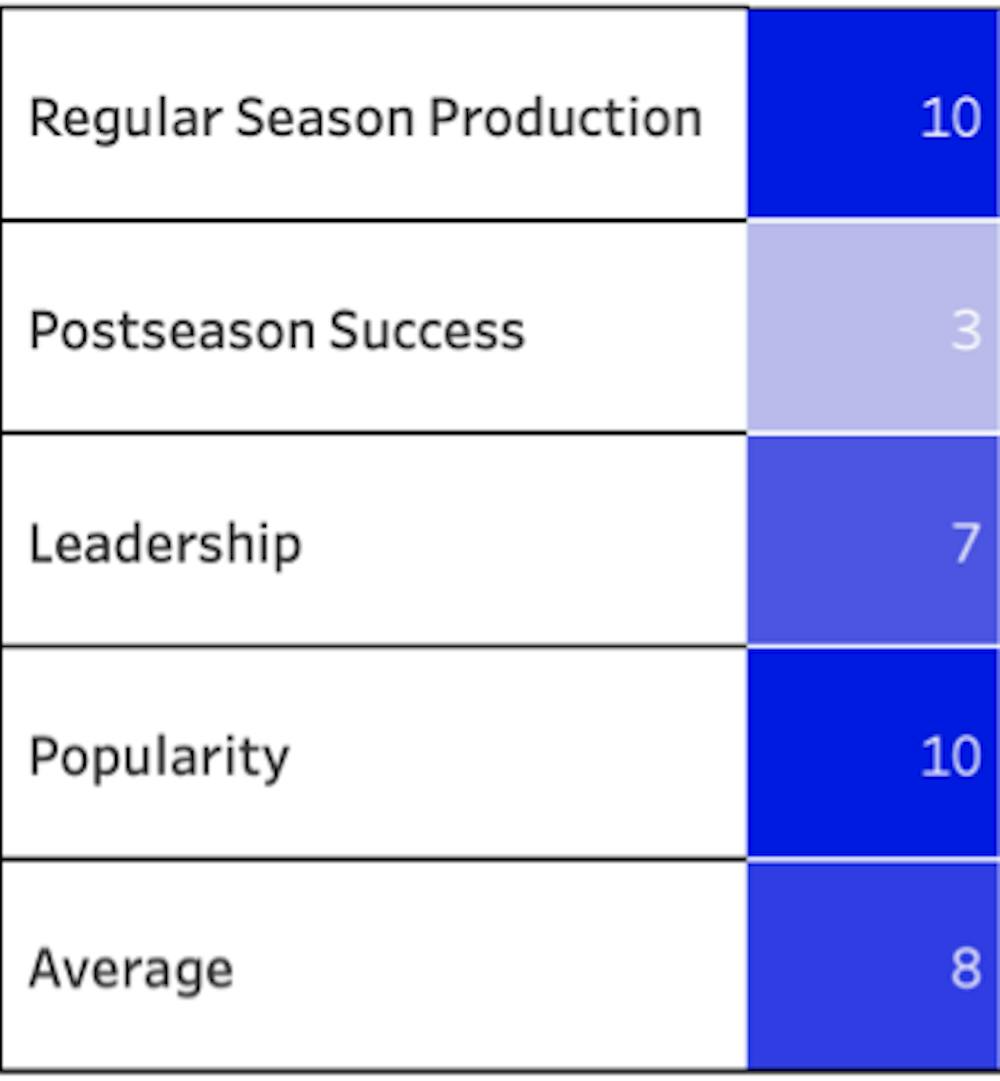
Players who have worn the number 1 include dominant bigs, highly-touted NBA prospects and high-flying dunkers. Williamson and Kyrie Irving’s NBA stardom also support 1’s case as the most popular jersey number in Duke history. Soon-to-be-drafted freshman Vernon Carey Jr. led the 2019-20 team in scoring and rebounding but didn’t get the chance to show off if he had the clutch postseason gene due to the COVID-19 pandemic. 1s are known for one-and-done stardom but don’t have the rings to support their status as the best jersey number in Duke history.
1) Number 5
Notable Players: R.J. Barrett, Tyus Jones, Mason Plumlee, Daniel Ewing, Luke Kennard, Rodney Hood
The number 5 has both championship pedigree and some of the most prolific one-and-done players in Duke men’s basketball history.
Expectations were high for No. 1 recruit R.J. Barrett and his freshmen co-stars. In 2018-19, Barrett led the ACC with 22.9 points per game en route to an ACC championship, the Jerry West Award and consensus All-American honors. Barrett even shouldered the point guard load in the two-game absence of Tre Jones and secured vital ACC wins against Virginia and Pittsburgh.
In 2015, point guard Tyus Jones earned Final Four MVP and Tournament Most Outstanding Player after hitting the game-sealing bucket against Wisconsin in Indianapolis. In his lone season at Duke, Jones managed a respectable 11.8 points per game but most notably registered a remarkable assist-to-turnover ratio of 2.9 to 1.
Mason Plumlee played four strong years in college before departing for the NBA in 2013. As a senior and a team captain, Plumlee nearly averaged a double-double with 17.1 points and 9.9 rebounds per game. Plus, he’s extremely well known in Duke fandom for winning a title while on the same team as his brothers Miles and Marshall in 2010.
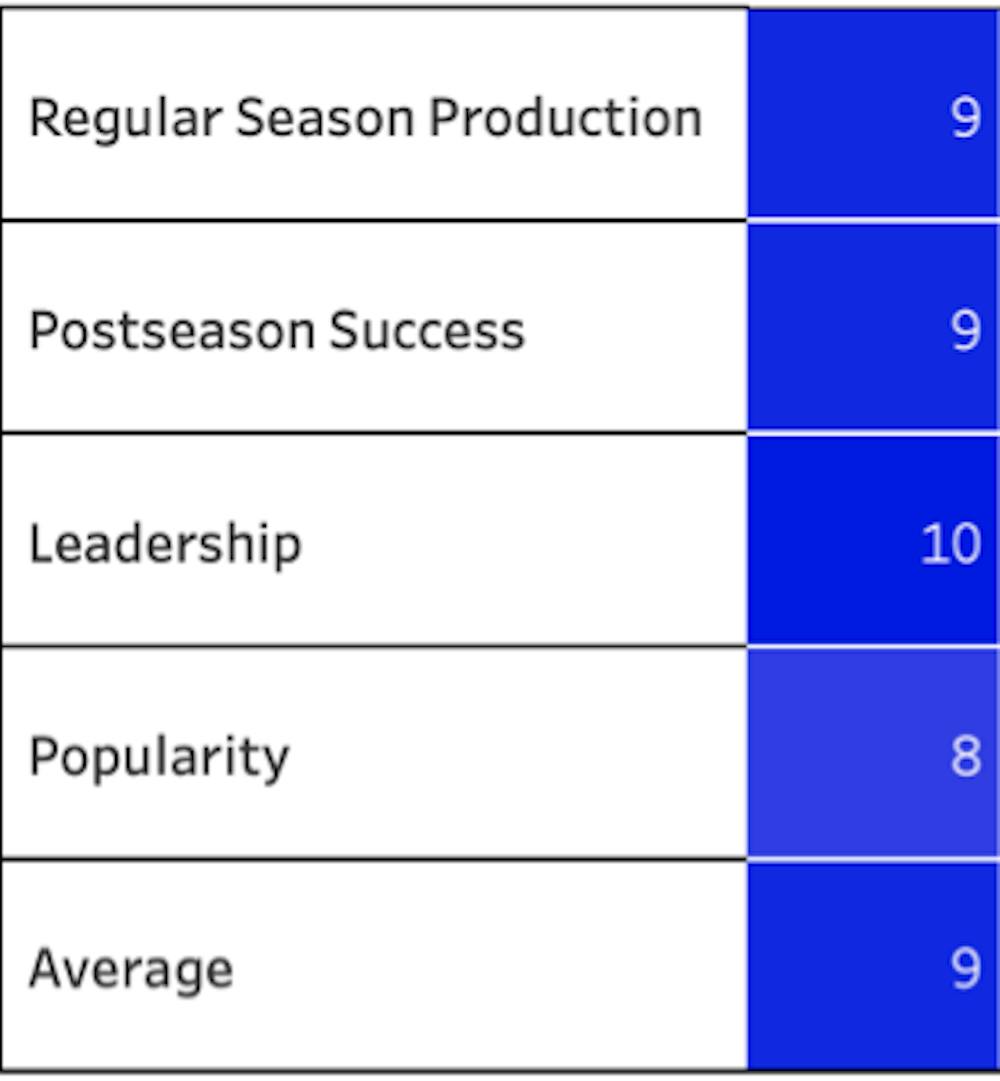
It’s not just the titles that make 5s great. It’s the consistent post and regular season top-flight production that defines them. The players that have worn this number repeatedly demonstrated their value to their teams and all contributed to significant wins. 5s aren’t just role players or significant starters. 5s led Duke’s best teams to championship-level heights as the faces of their teams.
Get The Chronicle straight to your inbox
Signup for our weekly newsletter. Cancel at any time.

